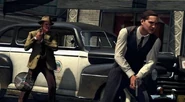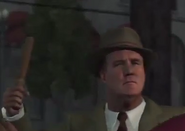
|
Spoiler Warning |
| Plot details follow, read at your own risk. |
- "Rusty's Razor. You blame the guy that's banging her."
- ―Rusty Galloway, on the main suspect for female homicides.
Detective Finbarr "Rusty" Galloway is a central character in L.A. Noire. Galloway was Floyd Rose's partner while Cole Phelps is in the Patrol and Traffic desk. Rusty became Cole's partner when Cole is promoted to Homicide, and later Stefan Bekowsky's partner when Cole is promoted to Vice.
Biography
Background
Rusty was born in 1901. Little is known about his family life growing up, although he mentions to Phelps that he was once an altar boy. He has been married and divorced three times. He has a 14 year old daughter with one of his ex-wives, though this was unplanned. Rusty served many years in LAPD and became a veteran Homicide detective and worked alongside Floyd Rose.
- "Phelps, I don't care that you just got smacked in the head, you don't call me Finbarr."
- ―Rusty Galloway
Galloway prefers the nickname "Rusty" over his embarrassing given name, Finbarr. Despite his dedication and experience, throughout his later years Rusty became a borderline alcoholic as well as lazy with his work.
Events of L.A. Noire
Patrol and Traffic
Rusty is seen along with Floyd Rose, investigating Scooter Peyton's murder, although they dropped the investigation. Rusty is later seen in Cole's first day in the Traffic desk, he is one of the officers and detectives in the room, along with his then-partner, Floyd.
Homicide
- "Stand up, Phelps. Take a cheer. You're in the major leagues now, sonny. Rusty Galloway, a fine lawman of the old school, will be taking you under his wing."
- ―Captain James Donnelly, on Phelps's and Galloway's partnership
As Cole Phelps received a promotion to the Homicide squad, replacing Floyd Rose, Rusty was partnered with Phelps. They both were initially tasked with solving the case of the death of Celine Henry, which due to similarities with the murder of Elizabeth Short, gets tied by the press to the Black Dahlia Killer.
- "It leaves me saddled with a chump like you, Phelps. I didn't ask for you and I don't want you. So keep it to yourself."
- ―Galloway, displeased by being partners with Cole Phelps
Initially, he resented Phelps' swift promotion to the Homicide desk, and treated him with arrogance, since Phelps was only a member of the LAPD for a little over a year, whereas Rusty had to work for a lot longer to achieve the same position. Eventually, they got used to each other and Galloway was more friendly. Furthermore, Phelps' assumption of the Black Dahlia killer lead only irritated Rusty, believing Phelps to be very self-serving, and wanting to solve the case for his own personal glory. The case ended with the arrest of Alonzo Mendez.
Subsequently, Cole and Rusty received several similar cases of murder that appear to be committed by the Black Dahlia but always ended up leading to unlikely suspects (such as a pedophile, a strange fruit store owner, a crazy homeless man and a socialist writer with anger issues) through suspiciously strong evidence.
With strong cases and convictions, Rusty dismissed the possibility of the serial killer and dismissed the similarities between each murders as copycats. Regardless, both Phelps and Rusty's actions earned good press for the LAPD as well as strong praise from Captain James Donnelly. Throughout their time together, Rusty developed more respect for Phelps, praising him as a good case man and the two built a proficient partnership, becoming Donnelly's "finest crusaders."
However, when the Homicide department received a series of strange letters containing extracts from Percy Bysshe Shelley poem "Prometheus Unbound," Phelps and Donnelly could no longer ignore the possibility that a serial killer was on the loose.
- "We're gonna catch hell for this. Banging up innocent men."
- ―Galloway, after realizing that they had arrested innocent men over their last five cases
Donnelly warned both Rusty and Phelps that if they didn't catch the true killer then their careers would be over for their wrongful convictions, and would have to face the public and press' outrage.
Phelps read the poem extracts carefully and discovered that the letters where leading them to various landmarks throughout the city. At the first location, the public fountain, they discovered not only another extract but also found Elizabeth Short's social security card. Throughout the rest of locations was a test or trap leading to an item from one of the victims of their previously solved cases.
Rusty finally realized that they were being set up by the Black Dahlia killer who also responsible for the other murders. Despite their mistakes, Rusty saw this as opportunity to appease Donnelly and the press, providing they could catch the killer.
The final clue led Phelps and Rusty to a hideout at the Christ Crown of Thorns, an old abandoned church, where Garret Mason awaited. Phelps recognized Mason as the temp bartender at The Bamba Club during the Henry case. Mason in turn applauded Phelps for having the tenacity to find him, while dismissing Rusty as a "boorish ignoramus." Mason fled into the church catacombs and after an extended chase that ended in the church's graveyard, Phelps shot and killed Mason.
Despite being the Black Dahlia killer and even with compelling proof of his murders, Captain James Donnelly revealed to Phelps and Rusty that Mason was actually the half-brother of a very influential and undisclosed politician, hence Mason's name and acts were to be kept out of public knowledge and out of official records. The suspects that were previously arrested were quietly released and the truth was quietly buried, thus ensuring Phelps and Rusty's silence.
Vice
- "Come on, Phelps. Even Roy looks like he's working. Get on with it."
- ―Finbarr Galloway
After Phelps was promoted to the Vice squad, Galloway was partnered with former traffic detective Stefan Bekowsky. The three along with Roy Earle all had a brief reunion while investigating the Julia Randall case. Galloway and Bekowsky aided the investigation, although the former was less cooperative than the latter, as he was skeptical of Phelps' burglary angle.
Arson
Rusty was later sent to investigate the murder of Dr. Harlan Fontaine, during which he discovered that Elsa Lichtmann was kidnapped, hence why he called for Phelps to come to the scene, knowing his relationship with her. Unlike most other characters, Rusty stayed friendly towards Phelps after the scandal with Elsa, most likely because he had been in three unsuccessful marriages himself.
After Phelps' death, Rusty went to his funeral, paying his respects to his former partner. With Phelps' death, it left Galloway and Captain Donnelly as the only ones left alive who knew the truth about the Black Dahlia killer.
Personality
- "You're the new face of the department, Phelps. The modern cop who tries to understand why the perp does what he does. Me, I just drop the hammer down on the lowlifes. You crunch a roach under your heel, you don't worry about what it's feeling, you just grind it into the pavement."
- ―Rusty Galloway
Galloway is a cynical and world weary detective that doesn't really take his job too seriously anymore. He is described by Captain Donnelly as an "old school and practical policeman." He is not afraid to stray from the book to bring justice to criminals by bullying or intimidating them. Galloway is often lazy, overeats, and is a borderline alcoholic, as revealed in The Studio Secretary Murder; Phelps had to tell Walter Robbins that Galloway was joking, under the impression that Galloway was going to get drunk on the job after he asks to tap some of Robbins' stock to help motivate him and solve the case faster. In "The Naked City," Roy Earle refers to him as "a drunk." He also called him "an old bulldog, who can't get up a flight of stairs without coughing up his lunch."
- "If I killed every wife that served me papers I'd be a mass murderer."
- ―Rusty Galloway
Unlike most other characters, Galloway is still friendly towards Phelps after the scandal with Elsa. He actually appears to be even friendlier towards him, though this is unsurprising, considering Galloway's attitude towards women. He also could've been friendlier because while the two were in the Homicide desk together, he kept trying to get Phelps to drop his loyal attitude towards women.
Case Appearances
Main Story
Patrol
Traffic
Homicide
- "The Red Lipstick Murder"
- "The Golden Butterfly"
- "The Silk Stocking Murder"
- "The White Shoe Slaying"
- "The Studio Secretary Murder"
- "The Quarter Moon Murders"
Vice
Arson
Street Crimes (Homicide)
- "Bank Job"
- "Bowling Lane Robbery"
- "Canned Fish"
- "Cop Killer Shot"
- "Death Plunge"
- "Honey Boy"
- "Killer Bandits"
- "Misunderstanding"
- "Running Battle"
- "Thicker Than Water"
- "Unsuccessful Holdup"
- "Vengeful Ex"
- "Would Be Robber"
Trivia
- During The Quarter Moon Murders, Rusty states to Phelps that he is "pulling rank" and asks Phelps to climb the drainpipe at the LA Public Library. This means that either Rusty is a higher grade detective than Phelps, or he was being officiously arrogant. He could also just be referring to the fact that he has been a detective much longer than Phelps.
- On two occasions, Rusty will mention someone named Parker. He could be referring to William H. Parker who served as the LAPD's Chief of Police from 1950 - 1966.
- Rusty is older than his superior officer Captain James Donnelly. His laziness towards the latter stages of his career may be a reason why he has never been promoted above detective. When talking about Donnelly, Rusty will refer to him as "Skipper" or "the Skipper" and even calls him this on a few occasions.
- He drives a 1947 Nash Super 600, which is department issued and fitted with a siren and a radio.
- Along with Cole Phelps, Rusty is the only character who has three or more known partners throughout L.A. Noire, having partnered with Floyd Rose, Cole Phelps, and Stefan Bekowsky, respectively.
- Rusty is a cigar smoker.
- The name of Michael McGrady's character in The Thin Red Line was Pvt. Floyd, the name of Galloway's first partner.
- His name implies that he is Irish American. Finbarr is an Irish name, and Galloway is a Scottish surname common in Ireland. Even though he is embarrassed by his name, and hates being called Finbarr, in The Silk Stocking Murder, Phelps called him Finbarr just to annoy him. Bekowsky did similarly in "The Naked City" case, where he called him Finbarr in order to return his fire.
- His badge number is 564.
- Galloway is overprotective of his suit numerous times throughout the Homicide desk, claiming that it cost $30, which is approximately $335 in the present time (As of 2017).
- Rusty is one of five characters whose appearances span all five desks, the others being Courtney Sheldon, Harlan Fontaine, Cole Phelps, and Mal Carruthers (Including appearances in newspapers)
Gallery
| |||||










